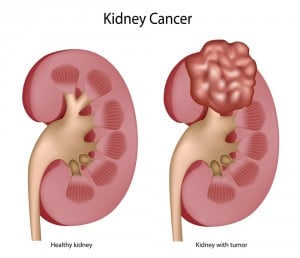Treatment of Kidney Cancer
Dr. Alex Shteynshlyuger is a fellowship Trained Urologist and Robotic Surgeon who specializes in the treatment of men and women with kidney masses and kidney cancer.
If you have any questions, to schedule a consultation or if you need a second opinion, please contact us or call 1-(646) 663-5515
Kidney Cancer Treatment: What You Need to Know
 Treatment of renal cancer is determined by the tumor size and location, the presence of venous thrombus, and patient characteristics. We treat patients with localized, advanced and metastatic kidney cancer.
Treatment of renal cancer is determined by the tumor size and location, the presence of venous thrombus, and patient characteristics. We treat patients with localized, advanced and metastatic kidney cancer.
Surgery
The standard treatment for renal cancer remains surgical excision called nephrectomy. This process results in excellent long-term, cancer-specific survival. Nephrectomy involves making a 3-8 inches in long flank or abdominal incision.[6,10]
- Radical Nephrectomy (RN)
Radical nephrectomy is the surgical removal of everything including the whole kidney. RN in the may increase the lifetime risk for dialysis because of previous underlying medical conditions.[6,10]
- Partial Nephrectomy (PN)
Partial nephrectomy or nephron-sparing partial nephrectomy is the surgical removal of part of the kidney (in this case, the part that contains the tumor). It can be performed through a traditional open incision, laparoscopically or robotically. The goal of partial nephrectomy is to remove the entire tumor while preserving as much normal kidney tissue as possible. PN not only has an excellent oncologic outcome but also results in better long-term preservation of renal function, leading to better overall survival. PN is usually the treatment of choice when RN results in either immediate dialysis or a high risk for subsequent dialysis, such as when the patient has a single functioning kidney, poor overall kidney function, medical or genetic diseases that threaten kidney function or bilateral kidney tumors.[6,10,11]
Laparoscopy
In recent years, RN has rapidly been replaced by laparoscopy which is associated with a lesser blood loss, decreased pain, shorter hospital stay, quicker convalescence, and improved cosmesis than RN but a similar impact on long-term renal function.
This process involves inserting telescopes that are inserted into the abdominal cavity through small ‘keyhole’ incisions. Laparoscopic radical nephrectomy is best suited for small, localized tumors that have not invaded the lymph nodes or renal vein.[6,10,13]
Cryoablation
Cryoablation causes tumor necrosis by intracellular dehydration and disruption of cell membranes from temperatures below -20°C. This process is minimally invasive, as the thermal energy is emitted by placing one or more needle-like applicators into tumors. The ablation is performed under an imaging guidance modality such as ultrasound, CT, or MRI. The best results are achieved in tumors <3 cm in diameter. Although cryoablation is effective, cryoablation is best reserved for older patients or those with other severe medical conditions.[6,9]
Active Surveillance
Small renal tumors may not negatively impact survival because of the slow tumor growth and there may be minimal risk of progression, particularly in patients with advanced age, a short life expectancy or in cases where the patient refuses treatment. As a result, active surveillance is the best treatment option.[6]
Chemotherapy
For patients with renal cancer, interleukin-2, interferon-α, sorafenib, sunitinib, temsirolimus, bevacizumab, pazopanib, axitinib and everolimus are available for use. Common side effects of these medications include hypertension and hand-foot syndrome.[7
Radiotherapy
It uses high-energy rays to kill cancer cells. It affects cancer cells only in the treated area. A large machine directs radiation at the body. The patient has treatment at the hospital or clinic, 5 days a week for several weeks. Radiation is not used often for treatment of renal cancer as it tends to respond poorly to radiation treatment. People with advanced metastatic disease who cannot have surgery may have radiation therapy to relieve pain and other problems caused by the cancer.[14]
Conclusion
There are no proven ways to prevent recurrence of kidney cancer; however, cessation of smoking, and a balanced diet may be helpful. It is active surveillance by means of regular follow up with your physician is highly recommended.
If you have any questions, to schedule a consultation or if you need a second opinion, please contact us or call 1-(646) 663-5515
